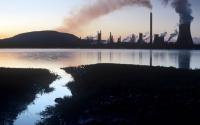Over Memorial Day weekend, with my family elsewhere, I drove to a multiplex to catch Roland Emmerich's global warming disaster flick The Day After Tomorrow. This was the film for which Bush administration officials briefly forbid NASA scientists to field press queries, lest perhaps the administration find itself in cold storage. It's kind of touching, really, that the Bush folks retain such faith in the power of Hollywood to perturb. Emmerich, you may remember, was the director who made Independence Day, released back in the summer of 1996. In it, space aliens, who couldn't even take a punch, nonetheless managed to zap into oblivion much of New York and Los Angeles as well as all of the White House before being defeated and driven out of the solar system. Eight years later -- enough time by Emmerich's cinematic calendar for the Northern Hemisphere to have been frozen solid several hundred times over – he's produced a new summer film in which New York, Los Angeles, and the White House are obliterated by something you can't punch at all.
I happen to remember Independence Day quite vividly because I took my son and daughter to see it and, driving elsewhere afterwards, launched into one of those long-winded critiques (the WASP runs the show in the film, the Jew is brainy, the black is physical, and the women… well, the women…) that can drive a kid, out for a little entertainment, bonkers. I was nattering on about the underlying structure of the movie when my son, then eleven, turned on me and said, his voice dripping with sarcasm, "Oh yeh, Dad, and the rest of the movie was really realistic, too! Aliens arrive in spaceships and destroy the Earth."
Of course he was right. You can't spend too much time analyzing films like these, even ones about something that might actually arrive. The Day After Tomorrow, which grabbed a cool $86 million over the four-day weekend, skating in just behind Shrek 2, combines ridiculous science, dead-on-arrival acting, and lame writing into a tsunami of fatuousness. For those of you who managed to leave Planet Earth for the weekend, the best summary of the movie I've found was written by David Edelstein (The Ice Age Cometh) for Slate:
"The Day After Tomorrow has one of the most absurd and implausible plot turns I've seen in a movie, ever. Global warming melts the polar ice caps, which makes the oceans rise and disrupts the Gulf Stream. There are lethal hailstones in Tokyo and ravaging tornadoes in L.A.; and after New York City is flooded by seawater, the temperature plunges at a rate of 10 degrees per second, so that people are transformed into ice statues where they stand. Tens of millions are dead and the upper United States has become uninhabitable. Now here's the implausible part. The vice president -- closely modeled on Dick Cheney -- who has pooh-poohed all evidence of global warming, goes on TV and says, 'I was wrong.'"
I won't destroy a second of suspense if I tell you that the Northern Hemisphere is turned into a snowball within a few cataclysmic Hollywood days, and an ice chunk by movie's end -- but couldn't Emmerich have left the ice-cubed Statue of Liberty to Planet of the Apes where it should remain forever a symbol of a previous notion of man-made Armageddon? (Oh, and speaking of Lady Liberty, in a pure Gulf-Stream-of-consciousness aside, let me quote a Tomdispatch reader from Quebec: "I couldn't help but be knocked over by the irony of Bush's promised bigger and better, state-of-the-art prison to be built in Iraq. How is the average Iraqi expected to react to this news? The French gave America the Statue of Liberty to celebrate America's freedom. And America is giving Iraq a new jail to celebrate its liberation?")
The Day After Tomorrow is one of those lame movies where, when zoo keepers, knee deep in water, notice that the wolves are missing from their cages, you don't doubt for a second they'll later appear to menace our young heroes. (Given the film's subject, the villains had to have fur coats.) As it turns out, this latest cinematic Armageddon ends on a bizarrely happy, not to say triumphant note. Perhaps the alien currents were driven back to outer space and I didn't even notice.
But here was the thing -- call it the miracle of the movies, which sometimes have a way of smash-mouthing through every sophisticated defense you've built up over a long life: The very fatuousness of the film set against a final vision of our planet from space locked in a new ice-age, gave me the total creeps. I drove off into a foggy night in an old clunker of a stick-shift car with lousy lights, all alone, and just a little unsure of my way through the ill-lit haze. I didn't think then about Al Gore's Moveon.org send-off for the film, or about the hyped-up dispute over its scientific accuracy, or about its inability to offer even the simplest explanation of global warming itself, or about the endless media babble over whether this film would fill the sails of the environmental movement or sink it beneath the waves; I just felt a chill. The pure willies. For that uncertain drive home in a car burning gas, and so sending carbon dioxide into the atmosphere to join the thickening blanket of pollution circling and warming our planet, I was haunted by a sense of the fragility of Earth and of human life itself.
Unfortunately, a few chills isn't nearly enough when it comes to even the ice-age version of global warming. As a start, the very phrase "global warming" is so harmless sounding, like a nice electric blanket on a cold night. Maybe a little of Emmerich's Hollywood should be dumped into the language immediately -- something like, say, "global inferno." As Bill McKibben, writing for Grist magazine commented recently (The Big Picture):
"It's always been hard to get people to take global warming seriously because it happens too slowly. Not slowly in geological terms -- by century's end, according to the consensus scientific prediction, we'll have made the planet warmer than it's been in tens of millions of years. But slowly in NBC Nightly News terms. From day to day, it's hard to discern the catastrophe, so we don't get around to really worrying."
I've written about global warming on and off for the last two years and always I end up quoting pieces about the peripheries of our world where the day after tomorrow is already today. Here are a couple of headlines just like others of recent years but from the latest batch of pieces: "Rising Seas Are Giving Pacific Islanders a Sinking Feeling" ("'Nobody remembers such tides before. The sea is actually moving inland,' said Simpson Abraham, head of Kosrae's Resources Development Authority. Some offshore islets have vanished, he said."); "Fast Arctic thaw portends global warming" ("The icy Hudson Bay in Canada could be uninhabitable for polar bears within just 20 years.") And I've cited many, increasingly alarming sentences that tend to read like this: "Concentrations of carbon dioxide, a byproduct of fossil fuels burned in everything from automobiles to electricity plants, reached record levels in the atmosphere last winter, a Hawaii observatory reported in March."
But if you really want to get the chills, or break into a sweat, check this out from a piece by William Kowinski (Getting Warmer…) in the Sunday Insight section of the San Francisco Chronicle. "While 72 percent of Americans said they were concerned about it in 2000, only 58 percent say so now, and only 15 percent believe it has anything to do with fossil fuel consumption." Since no specific poll is cited, I have no idea how accurate this is, but on this subject I do sense denial so strong that it might be easier if global warming were a set of Hollywood special effects bearing down on us. Otherwise, it's hard to get your brain around the time-scale of the phenomenon -- or perhaps the problem is that when you do, what sets in, along with those chills, is a sense of complete impotence, especially in an era in which futurelessness envelops us like a straitjacket.
Since the arrival of the first nuclear bomb over Hiroshima on August 6, 1945, it's become ever harder, I suspect, to imagine building a future for one's children and grandchildren -- and it's harder yet for young people in a new century whose distant reaches are already filled with the gloomiest of prognostications. When I was a boy, nuclear weapons were the only human-made danger that threatened to make us extinct or annihilate our planet -- and that was plenty. Now, nuclear weapons have to queue up somewhere at the rear of a jostling menagerie of apocalyptic candidates. They have, in fact, more or less disappeared into the ominous catch-all phrase "weapons of mass destruction."
The Bush administration fits such a world to a tee. When you think about it, futurelessness is its MO. We've probably never had an administration more willing -- no, eager -- to mortgage the future to the present. Perhaps soaring oil prices will prove the first tsunami that breaks through the consciousness of SUV America. I don't know. What I do know is that this administration has managed to focus all our fears on "terrorism" -- a phenomenon that is scary indeed, with the potential to cause ever greater magnitudes of mayhem. But, in truth, whatever destruction small bands of terrorists can cause doesn't begin to compare with the "terrorism" global warming, that other human-made weapon of mass destruction, threatens us with. Imagine what our world might be like if the Department of Homeland Security were really intent on protecting our future safety and security from the gravest dangers on our planet.
Renato Redentor Constantino, a newspaper columnist in the Philippines, whose pieces Tomdispatch has published before, spends part of his busy, committed life working on the issue of climate change in China for the environmental group Greenpeace. A Filipino working in China for Greenpeace on global warming and writing for an American blog. Now, isn't that one of the more hopeful descriptions of "globalization" around? In a piece below he offers his vision of "the day after tomorrow," emailed in from the front lines of climate change. But most important, he reminds us that we -- as individuals, as a society, as a planet -- are capable of doing something about global warming other than wringing our hands or looking fixedly down at our feet.
I'm convinced that, though Americans are hardly likely to sacrifice lifestyle for the sake of global warming any time soon, we might still be capable of offering a great fix. Just imagine if we had sunk the money (and ingenuity) that went into our Gulf Wars into a vast R & D project focused on renewable energy sources -- as well as into the kinds of national energy conservation programs that could immediately cut down significantly on our reliance on foreign oil. Unfortunately, all we can do, until the Bush administration departs, is imagine -- and work to toss the bums out. (If, by the way, you want to read up on the "basics" of global warming or its potential consequences, or simply think a little about steps an individual might take with it in mind, check out the website of the National Resources Defense Council, an organization which does a great job of dogging the Bush assault on the environment.)
Constantino offers the following as an introduction to his life and thoughts on the subject of global warming: "Working with Greenpeace in China continues to be an immensely moving experience. Climate change impacts in China are multiplied many times over because of the size of China's population. The attempts of individuals, groups, and some officials in the Chinese government to steer China towards a more sustainable path despite the enormity of the challenge they face has been inspiring.
"The consequences of the blind pursuit of economic growth have brought China to a painful impasse. There is growing recognition within the Chinese government of this fact, echoed most acutely by Pan Yue, the deputy director of the powerful State Environmental Protection Administration, who said recently, ‘If [China] continues on this path of traditional industrial civilization, then there is no chance that we will have sustainable development. Because China's populace, resources, and environment have already reached the limits of its capacity to cope, sustainable development and new sources of energy are the only road we can take.'
"I am part of a small group in China that believes that a renewable, sustainable future for China is a concrete possibility. We remain realistic; we demand the impossible."
And he adds: "The US represents only 4% of the global population and yet today it is producing a quarter of global climate-change inducing C02 emissions. The more wars it fights to slake the thirst of its petrol-addicted society, the greater the danger to everyone else on the planet. ‘If China were to live like Americans,' says Liang Congjie, an environmentalist from China, 'we would need the resources of four worlds do so.'" Tom
With Nature There Are No Special Effects
By Renato Redentor ConstantinoClimate change.
Suddenly, because of a movie, so many are now talking about the greatest threat the planet has ever faced.
The Day after Tomorrow is science fiction, but global warming is real. Will the movie end up trivializing the impact of climate change and thus increase indifference? Or will it spur more people to take action? Too early to tell.
Is reality more frightening than Hollywood? With nature there are no special effects, only consequences.
Up to 64% of China's glaciers are projected to disappear by 2050, putting at risk up to a quarter of the country's population who are dependent on the water released from those glaciers.
Today in the Arctic, ice thickness has declined by over 40% and "an area larger than the Netherlands is disappearing every year." According to scientists, Arctic sea ice could melt entirely by the end of the century.
Ice cores from Svalbard glaciers in the Arctic region show that the twentieth century was "by far the warmest century" in the last 800 years.
Between 1998 and 2001, the Qori Kalis glacier in Peru has retreated an average of 155 meters annually -- a rate three times faster than the average yearly retreat for the previous three years, and thirty-two times faster than the average yearly retreat from 1963 to 1978.
Just southeast of Mount Everest in the Himalayan Khumbu Range of Eastern Nepal, the Imja Glacier has been retreating at a rate of close to 10 meters annually. It is but one among many glaciers currently in rapid retreat. According to Syed Iqbal Hasnain of the International Commission for Snow and Ice, "Glaciers in the Himalayas are receding faster than in any other part of the world. If the present rate continues, the likelihood of them disappearing by the year 2035 is very high." Over two billion people depend on the glacier-fed flow of the rivers from the Himalayan mountains.
In Patagonia, ice fields have lost 42 cubic kilometers of ice every year for the last seven years, equivalent to the volume of ten thousand large football stadiums.
The scientific journal Nature published this year the findings of 19 eminent biological scientists. Climate change, they concluded, will "commit to extinction" 18% to 35% of all land-based animal and plant species.
Over 20,000 people died in Europe last year as a result of an extreme heat wave.
In Alaska, average annual temperatures have risen by 5 degrees since the 1960s.
According to leading reinsurance companies such as Munich Re and Swiss Re, climate-change related damages might cost $150 billion annually within a decade. The companies warn that unless action is taken today, the insurance industry could go bankrupt as extreme weather events such as storms and droughts increase in severity and frequency.
Vice Premier Hui Liangyu of China recently warned that his country is already facing "a grim situation" as warming temperatures inexorably give rise to increasingly unusual weather patterns. China has had 16 consecutive warmer winters since 1985 and temperatures are projected to increase in the coming decades. Last year, combined extremes of flooding and drought ravaged China's agriculture. In 2003, climate-change related damages cost an estimated $65 billion globally, including $10 billion in agricultural losses from last summer's heat wave in Europe. The impact of global warming on agriculture in the developing world, including, for instance, the salinization of irrigation systems owing to rising sea levels and depleted rivers, has been nothing short of devastating.
The incidence of diseases such as malaria and dengue fever carried by insects that thrive in warm temperatures is expected to increase dramatically in the coming years, possibly straining beyond limits the modest resources of government health systems in developing countries. Recent studies suggest that close to 300 million more people would be at risk from malaria if global temperatures continue to increase.
An eight-year study conducted by 100 scientists showed that in the southern Chinese province of Guangdong, sea levels are projected to rise by 30 centimeters by 2030. According to another study, sea levels may rise by 30 to 70 centimeters by the end of this century. The long coastline of China forms the base for about 70% of its large cities, where nearly 60% of the national economy is located. Some studies suggest that a 30-centimeter rise in sea levels will typically result in a 30-meter retreat in shoreline. How deadly then will the effect of rising sea levels be on archipelagic countries such as the Philippines?
Climate change is not called "the great amplifier" for nothing. Hunger, misery, thirst, and want -- the consequences of all the flaws in our world's economic systems will be magnified, giving rise to ever more resource-related conflicts in addition to those already created by the madness of the American imperial enterprise.
"Climate change," said Sir David King, Chief Scientific Adviser to British Prime Minister Tony Blair, "is the most severe problem that we are facing today -- more serious even than the threat of terrorism."
Great as the problem of climate change may be, most often neglected is the fact that solutions are readily available -- solutions that, sadly, are just not being used; solutions that can prevent climate change from taking a more dangerous and unpredictable trajectory; solutions that are not only immediately beneficial to the environment but have immense economic potential as well. The global wind industry alone, for instance, has been enjoying a growth rate of over 30% annually for the last five years with wind-power costs dropping by 50% in the last 15 years. Resources from the sun, the tides, the waves, geothermal power -- all these are waiting to be harnessed; waiting, despite the enormity of the danger confronting us, because the resources that should be used to tap their regenerative power economically remain dedicated to the fossil fuel and nuclear industries. A planetary betrayal.
We all know what the problem is: burning fossil fuels such as coal and oil along with the unsustainable and inequitable use of our planet's resources. And we know what we have to do. We must generate our energy from clean, safe, renewable resources and use our energy in a sustainable way.
Because there really is no other way.
The measurable, time-bound development of renewable energy based on real and ambitious targets, matched with deep, rapid cuts in CO2 emissions -- this is what's needed today if we are to save the global commons from devastating climate-change impacts.
Big or small, populous, powerful, or frail, each country and each individual has a central role to play in redirecting our planet away from its present deadly course. After all, as a great reminder goes, if the world were a huge airplane about to crash, would it really matter that you were seated in first class?
The task of taking back the pilot's cockpit from those who have hijacked our plane of a planet must be our number one priority.
The time for indifference is over. We must demand nothing less than an energy revolution. Taking action the day after tomorrow may well be too late. Actua ya. Act now. El dia es hoy.
The day for action is today.
Renato Redentor Constantino is the climate and energy campaign advisor to Greenpeace in China. His work includes documenting the impact of global warming, of dirty energy, and of energy policy there, as well as securing a beachhead for the massive uptake of renewable energy in the southern Chinese province of Guangdong, the economic engine of China at the moment. Constantino also writes a regular column for the Philippine national daily TODAY. He can be reached at [email protected]. He worked for a number of years as the climate and energy campaigner of Greenpeace in Southeast Asia.
http://www.nationinstitute.org/tomdispatch/indexprint.mhtml?pid=1478






